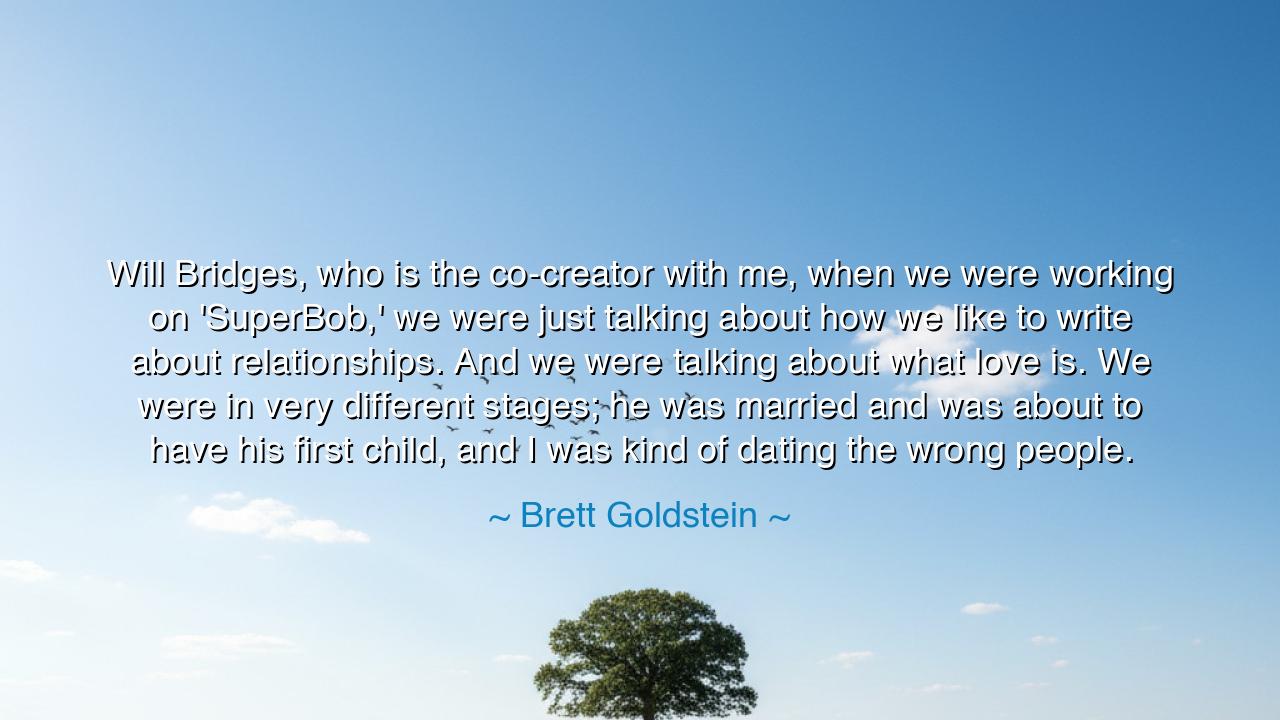
Will Bridges, who is the co-creator with me, when we were working
Will Bridges, who is the co-creator with me, when we were working on 'SuperBob,' we were just talking about how we like to write about relationships. And we were talking about what love is. We were in very different stages; he was married and was about to have his first child, and I was kind of dating the wrong people.






In the days when the heart still wrestled openly with its own mysteries, there came a saying from Brett Goldstein, who spoke of the quiet labor of love. He said that he and Will Bridges, his fellow craftsman in the making of SuperBob, spoke long into the night about what love is. And though they stood upon different shores—one preparing to welcome new life beside a wife, the other wandering among the illusions of wrong romances—they shared the same sea, that great expanse of human affection and longing. In this saying lies not a simple tale of friendship, but a meditation upon the many seasons of love, and how it molds the soul at each turn.
For love, like the moon, has phases. When it first rises, it dazzles the heart with silver light—new love, bright and untested. But as it matures, it waxes and wanes, revealing the deeper truth: that love is not the fever of desire, but the steady pulse of understanding. Will Bridges, in his marriage and approaching fatherhood, stood as one who had seen the deeper tide. He had learned that to love is not merely to seek, but to build, to endure, and to plant roots that nourish others. Goldstein, meanwhile, wandered as many do—through the wilds of yearning, through the forest of the “wrong people”—seeking a truth that had not yet taken root in his heart.
It is ever thus. The poets of old spoke of two kinds of love: Eros, the flame that burns hot and fierce, and Agape, the quiet fire that warms the generations. When one is young, he chases the spark, mistaking its brilliance for eternity. But in time, if he endures and learns, he discovers that true love is not a storm, but a shelter. Goldstein’s reflection upon this truth shows that the path of love is also the path of the self. It is not only about the finding of another, but the making of one’s own heart ready to love rightly.
Think, then, upon the story of Marcus Aurelius, the philosopher-king of Rome. He too loved, not with weakness, but with wisdom. When his wife, Faustina, stood beside him through war and governance, he did not speak of love as mere pleasure, but as partnership—a sacred duty of compassion and patience. Yet even this emperor confessed that the soul must first conquer itself before it can truly hold another in harmony. Such is the lesson that Goldstein’s words whisper to us: love begins not in another’s arms, but in one’s own awakening.
There is also in this saying a reverence for art as reflection. The making of SuperBob was not only the shaping of a film, but the forging of meaning. As Goldstein and Bridges worked, they did not simply craft characters; they wrestled with the essence of what it means to connect, to care, and to fail in the pursuit of love. Art, then, becomes the mirror of the heart. And in that reflection, the artist finds both confession and redemption. When two souls create together, they too are bound by love—not romantic, but creative, spiritual, eternal.
From this we may learn that every stage of love has its wisdom. The joy of discovery, the ache of loss, the quiet endurance of commitment—all are teachers in disguise. When you find yourself dating the wrong people, as Goldstein once did, do not curse your fate. Instead, give thanks that life is shaping your understanding. The wrong paths often lead to the right mountain. And when you stand at last beside one who truly sees you, you will know that all the pain was not in vain—it was preparation.
So let us speak plainly, as the elders once did: love is the greatest art of all, and every soul must apprentice in its workshop. Do not rush the lesson. Seek first to know yourself, to master your own storms, and to offer peace instead of passion alone. Let your love be both fire and foundation. And when you speak of love, as Goldstein and Bridges did, speak not only with longing, but with gratitude—for even in confusion, the heart is learning to become wise.
Therefore, let each reader take this truth as a compass: To love well is to live well. Be patient with your heart. Tend it as a gardener tends a fragile seed. Speak honestly, act kindly, and do not fear the loneliness of growth. For out of the silence of self-understanding comes the voice that can truly say, “I love,” and mean not possession, but freedom.






AAdministratorAdministrator
Welcome, honored guests. Please leave a comment, we will respond soon